A learning exchange was held on district-wide initiatives for Sustainable Development Goal 6 in Ghana.
Published on: 28/12/2020
National Development Planning Commission (NDPC) in collaboration with IRC Ghana, WaterAid Ghana and Water4/Access Development hosted the third national learning exchange on strengthening local systems through a district-wide initiative for safe and sustainable water, sanitation, and hygiene (WASH) service delivery for everyone.
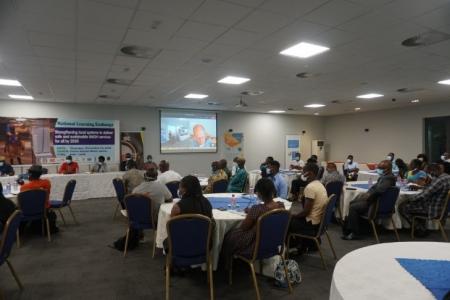
The highly subscribed annual learning event, which took place in Accra, Ghana on November 12, 2020 registered over hundred (100) participants drawn from fifteen (15) local assemblies, ministries, departments, and agencies, as well as development partners, civil society organisations, private sector, and the media.
In the first quarter of 2020, the NDPC in collaboration with IRC carried out a documentation exercise to collate and publish ongoing innovative WASH interventions from three selected district assemblies - Asutifi North in the Ahafo Region, Bongo in the Upper East Region and Wassa East in the Western Region, to highlight successes and challenges in the provision of water and sanitation services. The third national learning exchange focused on sharing the findings of the documentation exercise, and to give the three Assemblies the opportunity to showcase the innovations and good practices for WASH as a leverage for further interactions on local system strengthening for replication across the country.
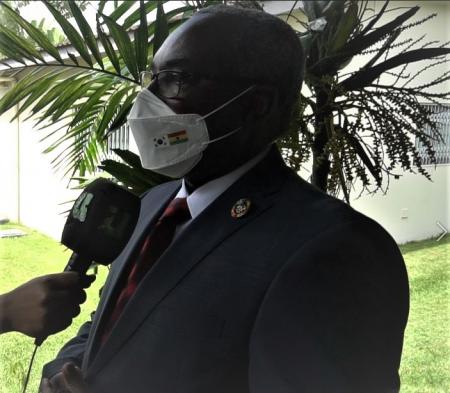
In his keynote address, Dr Kodjo Mensah-Abrampa, Director General of the NDPC stated, “It is our task to make sure that this is not just a district activity, but the good lessons from those districts are shared with all the remaining two hundred and fifty-seven (257) districts.” He revealed, “At this very time, we are preparing the National Medium Term Development framework, and plan subsequently. And therefore, as part of the guidelines we are bringing to the districts and the local governments, if these lessons are incorporated and become part of it; and we also have technical persons at the National Development Planning Commission, whose responsibilities are to hand hold these districts in planning, in implementing - being able to monitor and report on that, then it would take a very short time for us to get to all the remaining two hundred and fifty-seven local governments. So, this one becomes a geometric leap - taking advantage of the development planning guidelines and the National Development Planning framework and eventually the plan.”
Dr Mensah-Abrampa commended the high level of participation and partners involved, especially IRC for being a useful partner in driving the entire process.
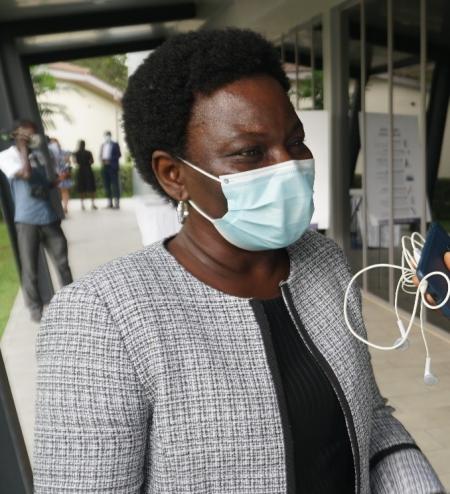
On her part, Vida Duti, IRC Ghana Country Director urged the local authorities, “As local governments, you play a very important role in ensuring that the people that you serve have access to water and sanitation services, and therefore we believe that having come here we would all work together in moving the good ideas forward. It is not only for those that are piloting to showcase what they are doing, but I think you have also come here with interesting things that might be happening in your districts that we might not know - so that is why we call it a learning exchange. The focal districts will share what they are doing because we are focusing on them. Also share your experiences and then together we will look at the steps towards bringing these interesting ideas to scale. IRC has been collaborating with the sector Ministry and NDPC to drive the process for scaling up, but our journey began with the Asutifi North District, working in collaboration with other partners.”
NDPC led the discussion with the complement of the three district assemblies - Asutifi North, Bongo and Wassa East, and their respective partners – Hilton grantee partners, WaterAid and Water4/Access Development. The mix of plenary and marketplace poster presentations brought to the fore the strong efforts and achievements the three districts have made working with partners to implement the district-wide initiatives to improve access to WASH services.
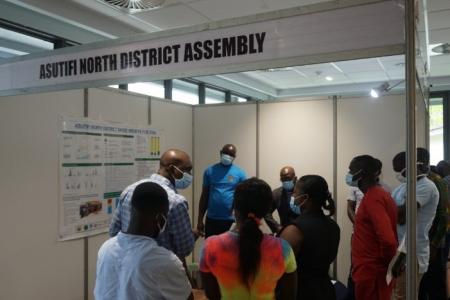
Key learning points for strengthening local systems and forging partnerships towards improved delivery of WASH and WASH-related Sustainable Development Goals (SDGs) were generated from the deliberations. The main lessons included the issue of a comprehensive WASH plan - every development agenda should be informed by a comprehensive plan jointly put together with clarity of roles, like the Asutifi North WASH master plan; and monitoring, evaluation and learning mechanisms established to regularly track progress and ensure accountability and participation of all stakeholders.
Furthermore, the drivers for the significant improvement in WASH service delivery in the three districts were identified to include:
Stakeholders also reflected on areas that require further attention and recommended that:
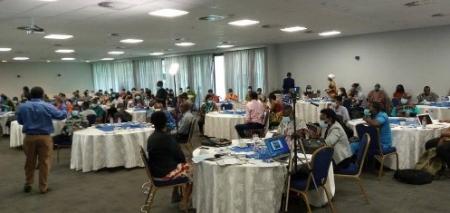
The national learning exchange provides a platform for like-minded partners implementing district-wide approaches to achieving WASH and WASH-related SDGs to share their experiences; and learn at first-hand how these approaches are being rolled out towards strengthening strong local systems to deliver safe and sustainable WASH services for everyone. This year’s edition focused on raising awareness and stimulating all-inclusive dialogue on innovative WASH interventions in the three districts to identify learning points for replication; and to widen the scope of the interventions towards securing universal access to WASH services.
The event attracted high level stakeholders such as Directors of NDPC, District Chief Executives, District Coordinating Directors, Directors of local and international NGOs, among others. The overall stakeholder impression across the range of participants was high with the other local assemblies calling for the presentations to enable them to engage on how to replicate the good practices shared.